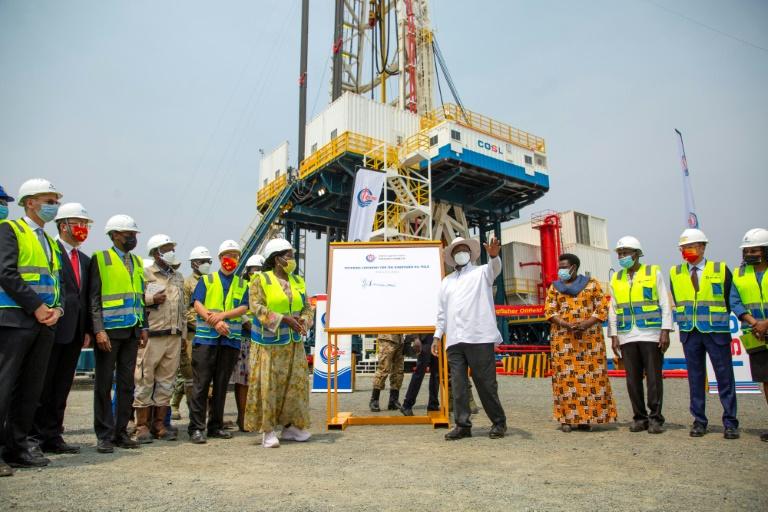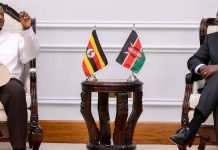By Faridah N Kulumba
Africa-Press – Uganda. On Tuesday this week, the President of Uganda Yoweri Kaguta Museveni commissioned Uganda’s first of four oil rigs to start drilling at the Kingfisher field on the shores of Lake Albert as the country prepares to start production in 2025. The development comes 12 years after the discovery of commercial oil deposits.
On 1st February last year, Chinese and French oil giants signed a USD10 billion deal to unlock Uganda’s energy resources and build a vast regional oil pipeline, a mega-project that incensed environmental groups that led the United Nations Parliament to intervene in this matter.
The Final Investment Decision was to pave way for the export of millions of barrels of black gold that was first discovered in Uganda in 2006. Full-scale commercial production is planned for this year despite the fact that the ambitious scheme has been criticized by environmental activists saying that it threatens the livelihoods of tens of thousands of people and fragile ecosystems in the hearts of Africa.
Approval of construction license
On 17 this month, the government of Uganda approved the awarding of the construction license of a USD3.5 billion East African Crude Oil Pipeline (EACOP) set to carry crude oil from the country to international markets.
The license was subjected to conditions including securing all necessary consents and permits. Other conditions are, the EACOP Company shall establish the main control for monitoring the 1,143km duct from mid-western Uganda to Chongleani terminal at Tanzania’s Indian Ocean Tanga port, and consulting and seeking approval from authorities for any deviation from the current pipeline route, among others.
Expectations
According to Uganda’s oil industry regulator, the country’s field known as kingfisher, es expected to produce 40,000 barrels of oil per day in 2025, but CNOOC officials are optimistic they could deliver the first oil ahead of schedule. At its peak, the country plans to produce about 230,000 barrels of crude oil per day.
Uganda’s reserves are estimated 6.5 billion barrels of crude oil, of which about 1.4 bThe three other rigs will be installed at Tilenga oilfields.
President Museveni switched on the rig – an LR8001 deluxe land rig – installed in November 2022 at the Pad-2 site at Buhuuka village, Kikkube District. It is operated by China National Offshore Oil Corporation (CNOOC) and will start drilling 31 oil wells on four well pads.
Expected revenues
According to Emest Rubondo the Executive Director Petroleum Authority 0f Uganda, the country’s current oil price is about USD87.5 per barrel. The Kingfisher project will account for 15 percent of the total oil revenue to the government from upstream operations, equivalent to USD 6.9 billion for the entire project, or USD 360 million per year.
The French TotalEnergies operated Tilenga Project– which will produce 190,000 barrels of oil per day – will account for 85 percent of the expected oil revenues.
The rig at Kingfisher will drill oil wells at varying depths, the shortest of which is about 2.6 kilometers, while the deepest is 7.4 kilometers. Uganda is aiming at exporting the drilled oil and refining it to export local petro-chemical based industrial projects.
Pipeline challenges
In mid-September last year the European Parliament criticized a proposed East African pipeline, calling for TotalEnergies to consider an alternative route. European Parliament was reacting to the grave concern around alleged human rights violations in Uganda and Tanzania, linked to the project.
According to the European Parliament, the EACOP project has led to the wrongful imprisonment of human rights defenders, the arbitrary suspension of NGOs, arbitrary prison sentences, and the eviction of hundreds of people from their land without fair and adequate compensation.
Conditions and proposals
The EU Parliament wanted Uganda and Tanzania to launch efforts to ensure respect and compliance with human rights for the project to go
ahead as planned.
Europe also called for the Ugandan government to reauthorize 54 NGOs that had been arbitrarily closed or suspended. It also said Ugandan authorities should provide free and unhindered access to the oil zone for independent observers, from local groups to international observers.
The EU proposed that Total should take one year before launching the project to study the feasibility of an alternative route to better safeguard protected and sensitive ecosystems and the water resources of Uganda and Tanzania. The resolution expressed concern about potential tsunami risks at Tanga.
The French company should also explore alternative projects based on renewable energies for better economic development.
Giant’s defense
The giant companies defended themselves saying that their new fossil projects are used to serve the global demand, for hydrocarbons. They added that these projects are also used to finance investments to develop renewable energies quickly and sustainably. And that the new projects are always validated through the prism of the ambition of carbon neutrality by 2050. Total Energies assured that it had taken steps to reduce the project’s impact on people and the environment
Museveni protested the resolution
Upon hearing the European lawmakers’ proposal to Total Energy, President Museveni assured Ugandans and the East African Community (EAC) region that the East African Company Oil pipeline (EACOP) project will go ahead no matter what.
He assured Ugandans that the first batch of oil will come out in 2025 according to the agreement and no one can stop this project. Uganda is ready to find someone else to work with if Total Energies chooses to listen to EU Parliament.
The Parliament of Uganda also lashed out at the EU Parliament. They condemned the resolution calling the move an act of economic racism and neo-colonialism thinking that the EU can control the economic affairs of independent African countries.
Efforts to ensure respect and compliance with human rights
The EACOP company executives have continued to keep their promise of putting efforts to ensure compliance with human rights. Acquisition of the project rights of way, including compensation to affected persons, is continuing on both sides of the border.
In Uganda, the oil pipeline project has affected about 3,648 persons, of which only 206 are physically affected while 179 opted for their houses to be rebuilt for them. Also, some 2,866 project-affected persons have signed compensation agreements, of which 2,468 have so far received their cash compensations for their land or crops.
In Tanzania, there are 9,510 project-affected persons, of which 96 percent or 9,111 persons have signed compensation agreements out of which 8,672 persons have received their cash compensations. The Tanzania section runs for 1,147km through 25 districts and eight regions.
Shares
French TotalEnergies holds a 62 percent stake in the project while Uganda and Tanzania each hold 15 percent, and Chinese oil company CNOOC has eight percent. China Petroleum Pipeline Engineering (CPPP) is leading the construction works for the project development coordinated by Australia’s WorleyPersons Ltd which was awarded the Engineering. Procurement, and Construction Management (EPCM) tender.
For More News And Analysis About Uganda Follow Africa-Press






